“My son told me that at The Abba’s Orchard School, they are taught to think beyond themselves.”
That was from a conversation I had the other day with a parent in the school I work for. She then continued:
“That is what this country needs.” I can’t help but agree wholeheartedly.
This past month was a whirlwind of activity, as
a world-renowned education personality visits our Montessori school here in the Philippines, and high school students of said school set out to impact their community. Here is a FANTASTIC video documentary that showcases both; and it is also
a great showcase to what the Erdkinder adolescent program of the Abba’s Orchard School is all about. It’s a long one (18 minutes), but you’re really, really gonna enjoy it. A big thanks to
MVP Digital Video for their masterful work.
Abba’s Orchard Erdkinder from
The Abba’s Orchard School on
Vimeo.
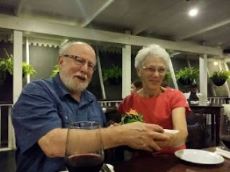 |
| David and Barbara Kahn |
So here’s the lowdown on what happened: on September 1 up to 3,
The Abba’s Orchard school had the honor of being visited by
David Kahn, the executive director of the North American Montessori Teacher’s Association (NAMTA) and
one of the foremost authorities on the Montessori adolescent program in the world. I explained his impending visit to my students using an allusion they were very familiar with: that it was like the Master Yoda of the worldwide Montessori movement is coming to visit us. He was accompanied by his lovely wife, Barbara, and two reporters from the Philippine Daily Inquirer, who wrote a great article of their visit
here.
Mr. Kahn is not a stranger to some, as he was the mentor of Mr. Chris, my boss, when he trained under him in the USA, and Ms. Jeni, the adolescent program’s head teacher, when she trained under him in Sweden. Also, some of my students met him in an international Montessori Institute for the Science of Peace (MISP) adolescent summit in Washington D.C., where they collaborated with other Montessori students from around the world on finding solutions to the global water situation (see the beautiful recap video of that event
here, with many of our students featured).
The said students came back to the Philippines with an action plan that they dubbed
#FundTheFlow, where they will endeavor to make an impact right here at home as we have great water problems of our own. You will see more posts on
#FundTheFlow in the coming months, as the
grade 10 students, the ones who spoke in the video above,
strongly believe that they don’t need to wait until they’re adults to make a big impact for their communities. They can already make a huge impact NOW. You will see what they have in store in the coming months.
David Kahn’s visit went very well. The students were petrified at first (I mean, he’s THE authority of the Erdkinder adolescent program worldwide, you know…no pressure), but
they quickly grew to love his fatherly nature and low key personality. Their
Business presentations were impressive as was the farm tour (both shown in the video), and Mr. Kahn had some nice things to say about both.
The grade 10 students number 16 all in all. I took ten of them to
Hinelaban Foundation in Sankanan, Bukidnon to do some work ahead of time, while the other six remained behind to handle the said business presentations. The Hinelaban group was exposed firsthand to
how hard it was for the indigenous people in the area to get clean water, and some of them became quite emotional during the exchange. They also
learned how important trees and forests are to our water supply; and the detrimental effects of our greed.
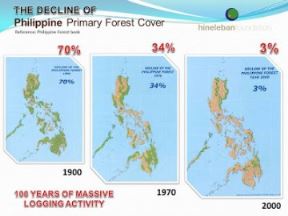 |
| As per conversation during the trip, now, 2015, we’re at around a mere 1% . Sad |
Without forests, we would not attract rain; and without forests, we would deposit massive amounts of silt into the oceans when it does rain, killing corals and forcing fishermen to go farther out to sea to catch fish.
Almost all reforestation efforts fail, but Hineleban’s efforts are one of the very few who succeed (again, more on this in the later months as #FundTheFlow develops; no spoilers here).
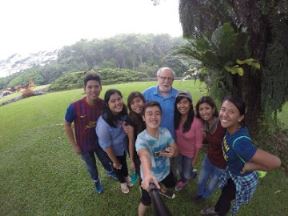 |
| From left: Andre, Angel, Lynn, Franklin, Mr. David Kahn,
Raine, Ms. Jeni, and Maria |
All 16 grade 10 students reunited at
Hineleban Foundation’s farm, owned by John and Renee Perrine, on September 3, along with David Kahn and the senior faculty of the school.
Here we all found out how Hinelaban helps both the livelihood of the indigenous people as well as the reforestation efforts of the area…and in doing so (using sustainable agriculture technologies) makes the
best Arabica coffee on these shores. They even have a deal where a tree is planted with every purchase of a bag of their coffee, and you can keep track of the said tree via GPS. Cool, huh?
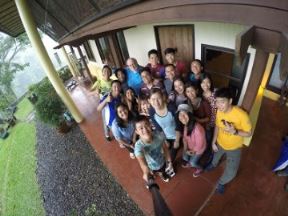 |
| David Kahn with the whole grade 10 class |
Exhausted but fulfilled, the seniors rode back to Cagayan de Oro on the morning of September 4, the same day that David Kahn and the directors of the Abba’s Orchard school flew to Manila to speak at an Academic Symposium at UP Diliman. We all were amazed at the richness of this experience, and even through it was grueling, we felt recharged not only physically but in spirit.
Once again, my fervor to be an adult who guides the next generation was rekindled, using the Montessori method of The Abba’s Orchard to do so.
I close with the words of one of the Hineleban staff, Nico, as he was observing them interact with the locals and take part in the discussions and activities. He said these simple but heartfelt words:
“I wish there were more kids like these.”
PS: I made a video a while back, showing
the testimonies of current and former students. See it
here, and it’s interesting that while academic excellence is a given, all of them focused on the non-academic benefits this school gave them.
The video is full of wonderful and honest insights from the children themselves. Again, see the testimony video
here.
However, I have also had conversations with current and former students and their families, discussing how
some of their relatives and friends are bewildered at, or make fun of, how their high school makes the students do farm work. The nicest of these comments simply wonder why; the harsher ones scoff at and question the usefulness of such activities and why on earth are they made to do something that is, in the commenter’s opinion, beneath them.
As a response, I would like to revisit an explanation for the farm that I did in a
previous article. Here’s a hint:
IT’S NOT ABOUT THE FARMING. As what both Mr. Chris and Mr. David Kahn said in the video, the farm is an excellent teaching tool. Allow me to tell you my take-away as a father of two girls who are in the program:
1. Real life application of academics. You use math to compute feed-conversion ratios, accounting, the computation of profit vs. cost; you use English for business reports and letters; there’s lots of science obviously involved; and of course, history will tell you that civilizations started with agriculture. For example, most students are only exposed to profit and loss and other similar terms in a textbook. Here they truly get to experience how profit and loss really is, trying really hard to get the former.
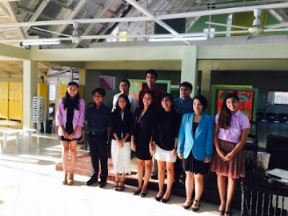 |
| The student-run business, IMAGINE CHICKENS, led by my daughter, Lynn
and her best friend, Raine. Read more about them here. |
2. Learning skills that truly matter. Schools and students are usually valued, maybe too much so, on grades and learning enough academic content to pass the big university exams. We have an excellent batting average there, for sure. However, hate me as a sacrilegious teacher, but I don’t think 99% of the high school students will actually use vectors, quadratic equations, the periodic table, etc. in real life. But leadership? Oh yeah. Working well with others? No doubt. Budgeting and planning? Yup. Composure and problem solving skills when things turn sour (like an animal getting sick, profits could go to the red, non-cooperative group members)? Surely. These are just as important, and I think more so, than whatever is learned through textbooks. Many schools prepare their students for college, we prepare ours for life.
3. Developing a love for nature. One of my great fears for my children’s generation is that so many grow up so detached from nature that when they become adults, they will less likely be inclined to protect it. Montessori kids, on the other hand, are much more in touch with nature and they often grow a deep desire to protect it. A connection with nature is emphasized from pre-school all the way up to the adolescent years, especially if it’s a farm campus like ours.
(As an aside, we are not the only school to visit Hineleban. I was told that another school also visited, but the the response was very different. When Nico gave the same presentation he gave us about the problems of our nation in regards to water and the importance of the forest, he noticed their blatant disinterest, so much so that he did not bother finishing his presentation. So sad.)
 |
| The “Erdkinder Exchange” wagon located at the front of the school, where they
display their pesticide-free, chemical fertilizer-free produce. |
4. Learning to wait. Another fear is that my kids will have a hard time learning to wait because they grow up in an instant world: instant communication, instant food, instant intimacy…instant results in almost everything, actually. But those of us who have been around for a while know that “beautiful things take time” (a quote by one of my students, who learned this in a school activity). They learn that in a very real way here at the farm, as you cannot rush a chick to become a chicken or a seed to become a fruit-bearing plant. They should get the picture and then learn to wait for other things.
5. Not as susceptible to the dark side of power, possessions, and popular opinion. Going gaga over the latest boy band? Becoming slaves to the latest trends and popular opinion? Catfights and, well, arguments in general? Gossip mongering and power plays? I’m not saying that these things do not happen here at the school, but many transferees said that these are noticeably much less here. Why? Well, who has time for all that when you have a business to run? Also, the community and service atmosphere that the curriculum stresses also lessens the “me, me, me” mindset and servant leadership amongst students is actually a common sight. Students also learn to handle money properly, linking earning to service.
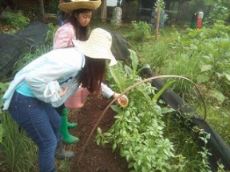 |
| Students Jeri and Zacky applying natural fertilizer (that they made themselves)
to their basil and turmeric plants |
6. Appreciating good ol’ hard work. A student once said, after he became a senior and had an exhausting first cycle in his student-run business, that he now appreciates how hard his parents work to send him to school. That’s a great breakthrough for him, who, like many students in private schools here in the Philippines, come from privileged homes. Indeed, getting children to work hard in the sun, handle soil and manure, wisely raise animals and plants, and keep careful account of all money transactions…it builds diligence and character, which is something that this country desperately needs more of.
Feel free to check out the school’s
website, and you’d be glad to know that
there are seven The Abba’s Orchard campuses all over the Philippines, four of them offering the Erdkinder Adolescent Program. And again, please do check out
Hineleban Foundation‘s
website, as they are doing amazing stuff there. Lastly, I would once again like to thank
MVP Digital Video for such an amazing piece, and I would like to encourage you to check out their website
here (wedding videos are their specialty, and boy are they good at what they do).
(This blog site, Lessons Of A Dad is mostly about parenting, marriage, and other topics aimed to develop the reader’s mind, body, and soul. I’d consider it an honor if you’d follow or subscribe to this site. You can also go to my Facebook page here, and I’m also on Twitter at @lessonsofadad)






wow… left me speechless
ReplyDeleteHello, my family is currently in qatar, but we are thinking of resettling back in cdo. We have a 7yo boy and we would like to transfer him to Abbas Orchard. Is there any website dedicated to the cdo campus that we can check? Your blog is a wealth of insight.. Thank so much.
ReplyDeleteHello there. You can check out www.theabbasorchard.com for information. There are currently 2 campuses in the Cagayan de Oro area: one in Alwana, and the other is the campus featured here, which is near the uptown CDO area. The school also has a facebook page that you can look up: https://www.facebook.com/abbasorchardschool
Hope your resettlement to CDO will go smoothly. If you are looking for a good place to stay, I also do real estate, so I can also help you out there. Delete